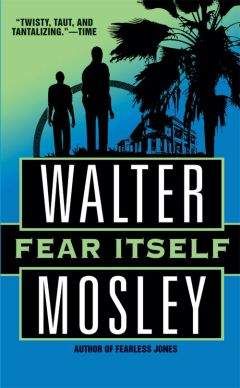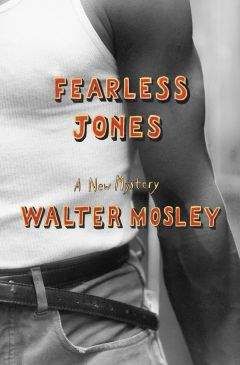Walter Mosley - The Long Fall
“About a month ago a guy named Ambrose Thurman called me. He said he wanted to hire me to find someone and would front me twenty-five hundred dollars for the legwork. He wanted to meet at the Crenshaw. I needed to keep up on my grocery bills and expected him to pay for the drinks.”
“Who is he?” Bonilla asked.
I took out my wallet and handed over the fake card Norman Fell had pawned off on me.
“Said he was an Albany detective working for a client up that way.”
The sergeant studied the yellow card and handed it over to Carson.
“He was looking for four guys,” I said and gave their nicknames. “I asked around the East Village, came up with their names, and turned them over. I visited Frankie in the can just to make sure he was who I thought he was. Same with Brown, only I never got to meet him. I left that card with the receptionist. That’s it.”
“You went up to meet this Thurman in Albany?” Bonilla asked.
“No, he came down here.”
“So what were you doing in Albany?” Her repetition of the city’s name set my teeth on edge.
“I saw that Frank Tork had been murdered. That bothered me, so I went up there to ask him what was up.”
“Why didn’t you call?” Carson asked.
“I did. Phone was disconnected.”
“What did he say?”
“There was no Ambrose Thurman in Albany. It was a sham.”
The two cops sat there, digesting my story. The card was a good touch. It had worked for Fell, maybe it would do the same for me.
“You think maybe this Sanderson guy was working with Thurman?” I asked after a respectable span of silence.
“I think maybe you know more than you’re saying.”
“I never heard of Sanderson. I wasn’t looking for him. I wanted to get the lowdown from Thurman before coming to you. But when he turned out to be a shadow, I got worried that he’d set me up. I guess I was right, only he was planning to kill me, not get me accused of the crimes.”
Carson was looking into my eyes so he knew I was lying, but he couldn’t figure out about what exactly.
“Do I know you, Sergeant?” I asked the homicide cop, partly to avoid Carson’s stare.
“I used to be in vice,” she said, smiling enigmatically. “Had a snitch named Dolores Devine back then.”
Dolores Devine, one of my many guilty victims. She’d set up half a dozen prominent men for prostitution stings with the feds and the NYPD. The wife of one of those men wanted revenge and was willing to pay. I found out that Dolores smuggled H for a man in Newark now and again. All I did was drop a dime, or maybe it was a quarter.
“Never heard of her,” I said.
“Oh?”
“Friend of yours?”
“We’ll check out your story, Mr. McGill,” she replied, getting to her feet. “Let’s hope that you’re more innocent than Dolores was.”
Ê€„
27
The police love it when a suspect, or just somebody they don’t like, is feeling uncomfortable. It doesn’t matter if that person of interest is innocent and doesn’t deserve the abuse. They don’t drop by and apologize the week after the case is cracked and somebody else is proven guilty. Their job is to make people like me feel nauseous and angst-ridden.
The police deal in ulcers and heart attacks, nonspecific neuroses and straight-out paranoia.
That’s why I learned the Buddhist practice of meditation.
After the representatives of the NYPD left my premises I sat me down in the office chair and took in a long slow breath while counting the number “one.” I exhaled, considering the numeral “two,” and went on in that fashion until I made it to “ten.” I started at “one” again, many times, until the counting fell away and all that wasÞng left was a kind of bliss that lasted a little more than half an hour.
I could have gone on like that for much longer but the buzzer sounded again. Rather than shock I felt only a mental nudge. I’d become a brightly colored carp resting in a chilly corner of a shallow Japanese pond. I breathed in through my mouth and looked down into my hall monitors.
Ryman Lucas and Hal Pittman were ugly men. Lucas had a nose, ears, and eyes that belonged on a much larger head. Pittman was just scary. He was always in a rage, and his face expressed that fact with brutal clarity. They were both white, the same height—under six feet but still way taller than I. They wore bad suits—one camel, that was Lucas, and the other a dusky orange.
I stretched languorously, putting my whole upper body into the movement, then pulled my .38 out of the top drawer and sauntered up toward the entrance.
The buzzer had sounded twice more by the time I’d reached the front door. I pulled it open slowly, then showed the thugs my pistol and gestured with the barrel for them to take seats in the receptionist’s visitors’ chairs.
Aura had replaced the confiscated assault chair with a posh brown-leather thing from somewhere in the bowels of the Tesla. It was set to the height I liked, which made me smile as I settled there before my attentive hostages.
“You don’t need no gun, LT,” Pittman said.
“You, on the other hand, need a new tailor,” I replied.
“Com’on, man,” Lucas chided. “We just here ’cause the man told us to be here.”
“In the beginning,” I said, hoping to prime them.
“Huh?” Lucas asked.
“Why are you here?” I felt the air leaving my lungs and the chair holding my weight.
Pittman recited a ten-digit number that began with the primary Chicago area code. A muscle in my left buttock tightened a bit.
I picked up the receiver with my left hand, cradled it against my ear on that side, and entered the numbers spoken.
On the first ring he answered: “Leonid?”
My right butt cheek knew the voice.
“Mr. Vartan.”
“I’m down on the first floor, south side of the building, at the Coffee Exchange.”
“I’ll be right down.”
I thanked Buddha for his breath in my lungs. Without that little bit of an edge I might have done something crazy—like murder the meãe mjusn sitting before me.
“You guys can go,” I said.
“But—” Pittman began.
I leveled the pistol and pulled back the hammer. That got my unwanted guests to their feet and out the door with no more argument.
This action sounds more deadly than it actually was. It was no more violent than slapping a horse on his belly when he has been acting both willful and lazy.
I WAS SURE that the leg-breakers would be waiting for me at the elevator doors on the first floor. When Harris Vartan tells someone to do something he is bound to be obeyed. That’s just the way things work in his world.
I, however, had left that sphere and could think of no better way to articulate that fact than to use the key that Aura had given me to take the utility elevator down to the first floor.
Vartan was sitting at a corner table, sipping his coffee from a porcelain demitasse cup. His lavender suit was somehow understated, while his tie, made from a print of Picasso’s Guernica, spoke of his sophistication.
With silver hair, olive skin, and eyes that at least appeared to be black, Harris Vartan was either the cream or the scum at the top of the container that is New York City. How you saw him depended on where you stood.
“Hello,” I said.
“Leonid,” the dapper advisor to evil said, giving me a minimal smile. “I see that you’ve eluded Tony’s men.”
This would be the only time that Vartan, known in both police and criminal circles as The Diplomat, would mention The Suit’s name.
You had to be on the ball to keep up with Vartan’s patter. He spoke in allusions and metaphors that were too vague ever be useful as evidence in a courtroom.
“I’m out, Mr. Vartan,” I said. “All the way out.”
The fit septuagenarian allowed another hint of mirth to flit across his lips.
No one gets out, his smile said, unless it’s on his back.
I first met Harris Vartan when I was twelve and he was called Ben Tilly. He and my father worked together as labor organizers, but Ben and my old man went on different paths.
“I’m only asking that you do what you do, Leonid,” he said. “After all, a man is defined by his labor.”
A cell phone sitting on the table started vibrating. Vartan paid it no attention.
“A man is also defined,” I said, “by those who work for him—and those whom he works for.”
“Sometimes it’s not so clear who is working for whom.”
“That may be,” I speculated, “except when the individual in question is self-employed.”
“No man is an island,” Vartan lamented, “no king not a man.”
At that point Lucas and Pittman appeared at the open glass doors of the coffee shop. Vartan raised a solitary finger, stopping them in their tracks.
“Do your job, Leonid,” Vartan said as he stood up from the table. “That’s all anyone expects.”
A waiter came up to him, saying, “Did you want your check, sir?”
“My friend is paying.”
Vartan departed with Tony’s dogs at his heels.
While taking out my wallet I wondered what it was my father’s old friend was telling me. Every nuance, including appearing there with Tony’s men, meant that whatever I did, it had to be just right.
Or not.
Ê€„
28
I once had a partner. His name was Bill. Bill was an okay guy and we were, at least from a technical standpoint, an ideal team in a shady kind of way. He was white—a tall, sandy-haired, handsome guy with a couple of years of college, which made him at least literate and able to deal with the concept of two plus two. I was a tree stump of a black man, home-schooled by a dyed-in-the-wool Communist revolutionary, with more books and ideas shoved into my mind than the librarian at Oxford’s Bodleian.
We, Bill and I, did things that would not have made us look good in front of a judge and jury but we were slicker than graphite on a block of ice, so the courts might as well have been in heaven while our feet were mired in New York clay.
I trusted Bill.
He trusted me.
I suspected that he’d slept with my wife a time or two, but Katrina and I slept around so much that the word “betrayal,” in our private lexicon, had synonyms like “naughty” and “sly.”
Bill and I didn’t have an office. We’d meet in coffee shops and stand-up pizza joints, planning how to take down innocents on behalf of our bent clientele. That was half of our business. The other half entailed the secret resolution of internal disputes.
One time we were hired by Four-fingers John Marr to pass a document to the police that would incriminate his rival, Hard Joe Tyner. It was a delicate procedure that took half a day of planning. We did it whær tile strolling through the Museum of Modern Art. Pretending to study the paintings of Lichtenstein and Rauschenberg, we hammered out a plan that would hit all the points of the service we provided.
Hard Joe had made one mistake in his otherwise spotless criminal career. He was extorting the president of an insurance company and accepting the money personally through a complex series of money transfers. Marr had gotten a list of the account numbers used. That’s all the cops would need. Once they identified the victim, all they had to do was offer him immunity and Tyner would fall, hard.
But Marr didn’t want his associates to suspect him and so he came to us—me and Bill.
“I don’t see why we can’t just put the shit in an envelope and send it to the detective in charge of investigating organized crime,” Bill said after we gave the guard our tickets.
“Tyner’s people would suspect Marr,” I said patiently. “He’s the one with the most to gain.”
“So?”
“It’s not professional, and anyway a good lawyer might be able to get evidence obtained in that fashion thrown out on some obscure technicality. Also, the police would get suspicious. Or worse, they might get stupid and ignore it.”
“We could turn it in ourselves,” Bill offered then. “Just walk into One Police Plaza and say, ‘Hey, look what we found.’ ”
“And we’d be their bitches from then on. Anytime we said no they’d threaten to turn us out.”
Our talks always started out like that. Bill had a good mind but he was lazy. He didn’t see our job as a craft, more like a pickup pool hustle, where there was always a chance that you could lose. Luckily he deferred to me when it came to finalizing a plan, so we went on with our museum excursion.
After getting our fill of culture we settled into the restaurant bar for espressos and biscotti. I brought up a friend of Bill’s who worked for Tyner. The man’s name was Sharp. Sharp was in debt to a bookie who wasn’t afraid of Tyner. Tyner didn’t like his people gambling and would have come down hard on Sharp if he heard about it. Sharp was also well acquainted with Tyner’s accountant, a man named Norman Bly. Bly had a girlfriend, Mae Lynn, who managed to look like Jayne Mansfield while not being much older than Shirley Temple—when Temple was singing “On the Good Ship Lollipop.”
The plan followed nature, which was always the best way to go. Why blast a path down a mountain when erosion has already excavated the best route?
First we would take some incriminating pictures of Bly and Mae Lynn, then we would go to Sharp and offer him the cash he needed to call off the leg-breakers; all he’d have to do was put a few papers in Bly’s briefcase on a certain day. We’d pretend that the papers were only there to incriminate Bly.
Now it made sense to go to the organized crime unit. We’d have a delivery service haëverem"nd over the pictures and Mae Lynn’s father’s address. That very afternoon Bly and Lynn were going to meet in a midtown hotel managed by Tyner’s real estate company. We didn’t have to worry about the cops ignoring our delivery. They’d be happy to pass around pictures of a mature fourteen-year-old and old fat Norman.




